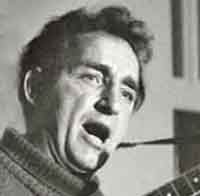Carickfergus is one of the most popular of Irish songs but the meaning is sometimes unclear.
Carrickfergus
Carrickfergus videos
Lyrics and Chords
This may be because of the unusual way in which the song was discovered and brought to a wider audience.
It was largely unknown before Dominic Behan recorded it in the early 1960s. Behan said he learnt the song from the Irish actor Peter O’Toole. The question is, how reliable was O’Toole’s version of the song he probably first heard in childhood?
For example, the opening line is: “I wish I was in Carrickfergus, only for nights in Ballygran.” The first part about Carrickfergus is fine, but what does the second part mean?
It doesn’t seem to mean anything and one possible explanation is that O’Toole, or Behan or whoever passed on the song, may not have remembered the words correctly and so glossed over them.
I would swim over the deepest ocean

The second line brings us into familiar territory involving water keeping him apart from his love but then it gets a little strange again.
As in most “water is wide” songs, he wishes for a boat to ferry him over to his love but it is expressed in a strange way: “to ferry me over to my love and die.” Does he mean he wants to be ferried over to see his love once more so he can die in peace? It is not convincing.
Anomalies due to mishearings?
Again, could the explanation be a mishearing? Other lyrics in similar songs have lines like:
“Give me a boat that will carry two, and both shall row my love and I.” The last two words, “and I,” make sense in this version but they could easily could be misheard as “and die,” in the O’Toole/Behan version.
Behan’s second verse is consistent
Behan claimed to have written the second verse and there is no reason to doubt him. On the contrary, his claim is supported by the fact that the second verse is consistent and contains none of the anomalies of the other two verses which may have been modified over hundreds of years.
These inconsistencies are particularly marked in the third verse.
They’ve marble stones as black as ink
The third and final verse refers to marble stones in Kilkenny, supporting his love with gold and silver before suddenly announcing that the singer will perform no more until he gets a drink.
The song then takes a dramatic shift in mood as we discover that the singer is seldom sober and believes that his days are numbered and he hasn’t long to live. These appear as disconnected thoughts and may be a truncated version of an earlier, longer lyric.
Carrickfergus – a great but incomplete song
Carrickfergus is a great but possibly incomplete song. Whether the O’Toole link to its discovery is right or not, it seems likely that what has now become the generally accepted lyric is in fact an inaccurate recollection of a fuller and more consistent earlier version.
Not that any of these issues have done much to affect the popularity of Carrickfergus. For all their faults, the lyrics still conjure up a sense of sadness and nostalgia and when coupled with such a beautiful, soaring melody, the effect is quite magical.
It is a song that moves people deeply and it is little wonder that it has become one of the most popular of all Irish ballads. Videos of Carrickfergus here.
Carrickfergus
Carrickfergus meaning
Carrickfergus videos
Lyrics and Chords
